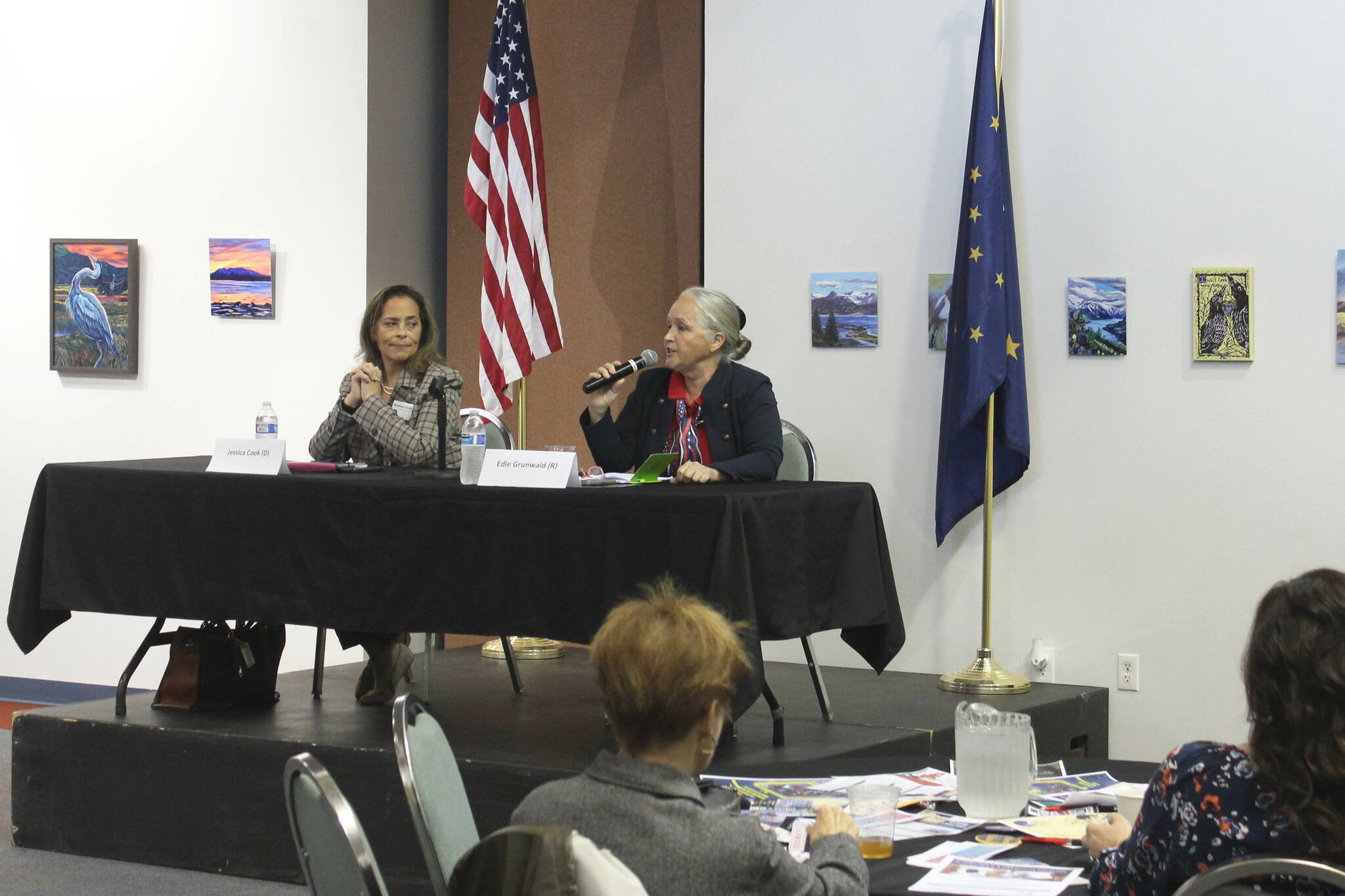Two of the four candidates vying to become Alaska’s next lieutenant governor participated in a forum at the Kenai Chamber of Commerce and Visitor Center on Wednesday.
For roughly an hour, Jessica Cook, who is running with gubernatorial candidate Les Gara, and Edie Grunwald, who is running with outgoing Kenai Peninsula Borough Mayor Charlie Pierce, fielded questions submitted in advance by chamber members. The forum was hosted by the Kenai and Soldotna chambers of commerce and was moderated by Merrill Sikorski.
Cook is a lifelong Alaskan who holds two master’s degrees in education and most recently worked as a teacher for the Anchorage School District. Grunwald holds master’s degrees in business organizational management and strategy, national security and military. She is a retired U.S. Air Force colonel and most recently served as chair of the Alaska Parole Board.
Lieutenant governor candidates Heidi Drygas, who is running with Bill Walker, and Nancy Dahlstrom, who is running with incumbent Gov. Mike Dunleavy, did not attend Wednesday’s forum. Drygas attended last week’s gubernatorial forum, where Gara and Walker participated.
The four tickets were the highest vote-getters in the Aug. 16 primary election.
Cook and Grunwald differed on multiple issues, including whether or not a state constitutional convention should be held, ranked choice voting and whether “the majority” of voters trust Alaska’s current election process. Both candidates said whoever is elected should represent all of their constituents, not just the ones who voted for them.
Grunwald said the health of Alaska’s economy and medical freedom are issues voters say are important to them, while Cook said bodily autonomy and funding for education have emerged as priorities.
Grunwald supports a state constitutional convention — which Alaskans get to vote on every 10 years — while Cook does not.
Grunwald said she plans to run to be a delegate if Alaskan’s vote “yes” in November and that a convention would provide an opportunity to write the Alaska Permanent Fund dividend into the document.
“If I don’t make lieutenant governor, I’ve already announced that I’m going to run to be a delegate in my area so I can be a part of the state constitutional convention,” Grunwald said.
Cook said a convention would open the entire document up to special interests and said amendments are an alternative way to make changes.
“You can’t open just one part of the Constitution,” Cook said. “When you open the Constitution, you open the entire Constitution, and there are too many special interest groups that would try to get in pieces into every little thing.”
Cook and Grunwald also disagreed on what should be done about ranked choice voting. Cook said Alaskans should “give it a chance,” while Grunwald said “the old system was fine.”
“This ranked choice voting is a mess,” Grunwald said. “It’s confusing. People don’t understand it. They don’t even know that — a lot of people don’t even realize that there’s an election Nov. 8.”
Both Cook and Grunwald, who both live in the Matanuska-Susitna area, said they hear a lot of concerns about state elections. Grunwald said she thinks “maybe” 47% of voters trust Alaska’s election process.
“A lot of the people that I’ve talked to come from the Mat-Su, alright?” Grunwald said. “I’m just gonna put that out there. They’re pushing for hand counting without those Dominion machines and, I gotta tell you, if that’s what the people want, that’s where we need to go to go with it.”
Cook said she thinks most voters trust Alaska’s election process.
“While there has been no evidence to back up any of the claims against the Dominion voting machines, and Alaska does not use electronic voting machines frequently, I think there’s enough concern that if we have that random selection of at, at minimum, one precinct per House district having a hand count, to reconcile and verify accuracy, that that would be enough to say our voting system works and our counts are accurate,” Cook said.
Alaska voters will on Nov. 8 have the option to rank multiple combined governor and lieutenant governor tickets.
The Dunleavy and Dahlstrom ticket emerged as the highest vote-getter during the Aug. 16 primary, clinching about 40.43% of votes. They were followed by Gara and Cook, who received 23.06% of the vote, and Walker and Drygas, who received 22.77% of the vote. Pierce and Grunwald came in fourth place with 6.58% of the vote.
The ranked choice ballot shows a grid of bubbles, with one row for each candidate and one column for preference order. Voters fill in the bubble in the “1st Choice” column that corresponds to their first-choice candidate. Voters then move to the second column and fill in the bubble that corresponds to their second-choice candidate, and so on. Voters can rank up to four candidates, or just rank one, two or three candidates.
If a candidate receives more than 50% of the first-choice votes, that candidate would be declared the winner of the election.
If no candidate receives more than 50% of the first-choice votes, the candidate who received the least number of first-choice votes is eliminated. Then, the voters who ranked the eliminated candidate as their first choice would have their second-choice candidate votes distributed to the remaining candidates. The process will continue until one candidate emerges with more than 50% of the votes.
More information about the Nov. 8 election can be found on the Division of Elections website at elections.alaska.gov.
Reach reporter Ashlyn O’Hara at ashlyn.ohara@peninsulaclarion.com.

